As someone who doesn’t believe in gods, I must sheepishly confess that I find them fascinating. I think it’s because, in my own way, I consider myself a person of faith—it’s just that my faith, the thing that gives me comfort and joy in this world, is the belief that there are no gods. And it is absolutely a belief, straight up. I’m not a rationalist. I’d much rather flop around in the subjective, and that’s what I look for as both writer and reader. I’ll show you my world (through Rachel-coloured goggles), and you show me yours.
I like gods in fantasy, but even more than that, I like characters who struggle with belief and with proximity to the divine. It’s a struggle I’m familiar with, godless though I am, and one of the most stubbornly human things we do. Here, then, are five books that dig into the theological in a way I’ve enjoyed. Are they the best ever? I’m going to say yes. Subjectively, of course.
Raphael, by R.A. MacAvoy
 I will give the slightest of disclaimers here: I read this when I was twelve. So, thirty years ago. I’m sort of scared to pick it up again, because the books that shine incandescently when you’re that age and leave a permanent after-image on your brain don’t always hold up when you’re an adult. I’m including this, though, as a sentimental favourite. I grew up in the Bible Belt, and this was my first exposure to the idea that maybe it was okay to transform immutable holiness into interesting stories. The archangel Raphael, condemned to live on earth as a human, falls in love with a Berber woman. I found it deeply moving, at twelve. You’re allowed to report back that it’s not.
I will give the slightest of disclaimers here: I read this when I was twelve. So, thirty years ago. I’m sort of scared to pick it up again, because the books that shine incandescently when you’re that age and leave a permanent after-image on your brain don’t always hold up when you’re an adult. I’m including this, though, as a sentimental favourite. I grew up in the Bible Belt, and this was my first exposure to the idea that maybe it was okay to transform immutable holiness into interesting stories. The archangel Raphael, condemned to live on earth as a human, falls in love with a Berber woman. I found it deeply moving, at twelve. You’re allowed to report back that it’s not.
Throne of the Crescent Moon, by Saladin Ahmed
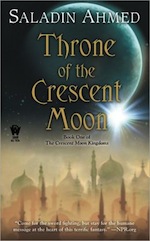 Oh, I love this so hard. It’s an Arabic-flavoured world, where people practice a monotheism (although is it literally Islam? There’s no mention of the Prophet, for example. This is something I’d love to hear Ahmed’s thoughts upon, if I ever have the chance). There are ancient, dead gods, perhaps corresponding to the Egyptian gods. What I appreciate most, however, is the glorious variety in how the characters approach their faith. Pragmatic, mystical, rigid, flexible—this book comes at belief from all angles. Even a monotheistic faith is not a monolith.
Oh, I love this so hard. It’s an Arabic-flavoured world, where people practice a monotheism (although is it literally Islam? There’s no mention of the Prophet, for example. This is something I’d love to hear Ahmed’s thoughts upon, if I ever have the chance). There are ancient, dead gods, perhaps corresponding to the Egyptian gods. What I appreciate most, however, is the glorious variety in how the characters approach their faith. Pragmatic, mystical, rigid, flexible—this book comes at belief from all angles. Even a monotheistic faith is not a monolith.
The Broken Kingdoms, by N. K. Jemison
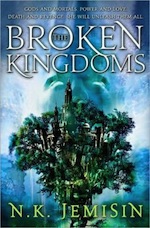 Gods everywhere! The gods here remind me of the ancient Greek pantheon, how they simultaneously transcend humankind and are the basest, crassest of jerks (I’m going to write a paper someday for the Journal of Crackpot Classical Theory, explaining how the assholery of the gods drove the ancient Greeks to create great art and philosophy, just so they could flip their gods the bird, but I digress). These are the best of deities and the worst of deities, and humans had really better stay out of the way. Faith, under such circumstances, is literally your relationship with your god. But can a human and a god be friends? One god, to his eternal chagrin, had better pray the answer is yes.
Gods everywhere! The gods here remind me of the ancient Greek pantheon, how they simultaneously transcend humankind and are the basest, crassest of jerks (I’m going to write a paper someday for the Journal of Crackpot Classical Theory, explaining how the assholery of the gods drove the ancient Greeks to create great art and philosophy, just so they could flip their gods the bird, but I digress). These are the best of deities and the worst of deities, and humans had really better stay out of the way. Faith, under such circumstances, is literally your relationship with your god. But can a human and a god be friends? One god, to his eternal chagrin, had better pray the answer is yes.
Feet of Clay, by Terry Pratchett
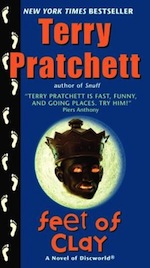 Have you ever lamented the dearth of atheists in fantasy? How can anyone be an atheist in a world where the gods are literally real? Well, my child, let Uncle Terry show you the way. Many of Pratchett’s books are meditations on the nature of belief—Small Gods comes to mind—but this is the best depiction I’ve seen of a mystical conversion to atheism, a sign from god (as it were) that there are, in fact, no gods.
Have you ever lamented the dearth of atheists in fantasy? How can anyone be an atheist in a world where the gods are literally real? Well, my child, let Uncle Terry show you the way. Many of Pratchett’s books are meditations on the nature of belief—Small Gods comes to mind—but this is the best depiction I’ve seen of a mystical conversion to atheism, a sign from god (as it were) that there are, in fact, no gods.
The Curse of Chalion, by Lois McMaster Bujold
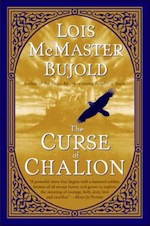 This is the queen mother of theological fantasy. Bujold has created a pantheon of gods and a theological system that make so much intuitive sense that I could totally believe in all of it, if I wasn’t already satisfied with my own beliefs. People are the only way the gods can interact with matter; free will is our ability to tell them no. To this I can only say, YES, PLEASE.
This is the queen mother of theological fantasy. Bujold has created a pantheon of gods and a theological system that make so much intuitive sense that I could totally believe in all of it, if I wasn’t already satisfied with my own beliefs. People are the only way the gods can interact with matter; free will is our ability to tell them no. To this I can only say, YES, PLEASE.
Honourable mention: Nation, by Terry Pratchett
It didn’t seem quite fair to put two Pratchett books on the list, and besides, this one really has no gods in it. This is the atheistic fantasy novel I wish I’d written, that perfectly captures the flavour—both ecstatic and bittersweet—of my own experience.
As a child, Rachel Hartman played cello, lip-synched Mozart operas with her sisters, and fostered the deep love of music that inspired much of her award-winning children’s novel, Seraphina. Its sequel, Shadow Scale, is available March 10th from Random House.










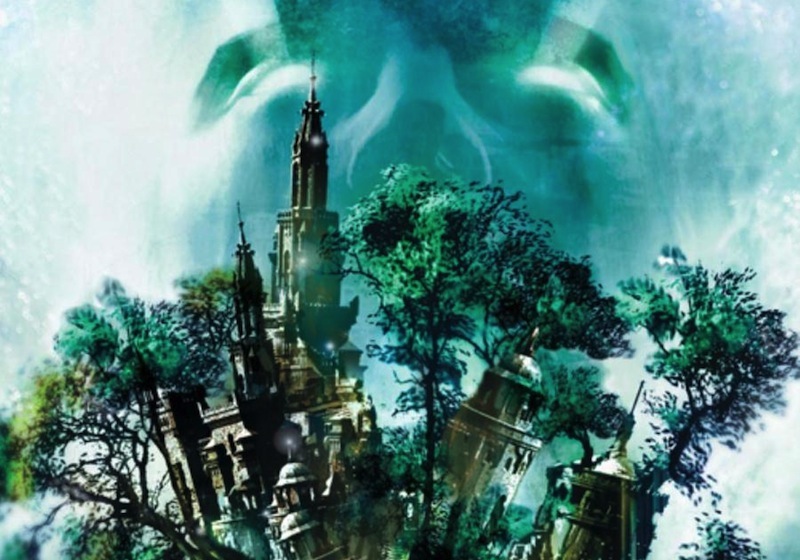
Jacqueline Carey does a great job with this “grappling with the divine” in all her books. She’s consistent with her theologies. Tor is currently doing a reread of her bestselling “Kushiel’s Dart” series here.
malazan book of the fallen by Steven Erickson has an interesting take on the gods. We see elder gods and newer gods. Viewpoints from men looking toward the gods, men ascended to god’s, gods who were never men. Various types of worship are discussed as well as what happens when the gods are ignored
I’d also recommend the Girl of Fire and Thorns YA trilogy by Rae Carson. Not exactly focused on “actual” gods/pantheon, but the world is populated by very religious folk and the protagonist is “chosen by God” for greatness.
An interesting set in this vein is the Long Price Quartet by Abraham. God-like beings who can be created and controlled if one correctly handles very complex steps but with horrendous consequences if one errs. Interesting society based on those parameters.
Teresa Frohock’s Miserere reallly, really needs to be on this list as well. Of the listed items, I’d say it’s probably closest to MacAvoy just in that it has a lot of kind of Renaissance theology going on, but it’s entirely its own thing.
Any series which contains the quote:
“If I am the pawn of the gods, it is because they know me so well, not because they make my mind up for me” is one that gets my vote. (That’s from Megan Whalen Turner’s Queen’s Thief series, by the way.)
I saw the title, and was all ready to jump in with “Jemisin! And Bujold!”
So I can only second the nominations. N.K. Jemisin writes gods better than anyone I can think of. And while Curse of Chalion was excellent, Paladin of Souls was even better, if only for the completely delightful relationship between Ista and her patron deity.
(And while they weren’t exactly gods, I truly enjoyed the mentions of the saints in Seraphina.)
A couple of notes:
It should certainly be mentioned that Raphael is third in a series (the other volumes being Damiano and Damiano’s Lute). It’s been a long time since I’ve read these, though, so I can’t say offhand to what degree the third can or can’t be read independently.
In the context of theological fantasy, one certainly shouldn’t overlook Steven Brust’s extraordinary To Reign in Hell, directly retelling and re-examining Milton’s “Paradise Lost”.
And then there’s Piers Anthony’s For Love of Evil, the next to last in his “Incarnations of Immortality” sequence, also focusing on a version of Satan. For all of the complaints lodged against much of Anthony’s work, I find the “Incarnations” books fascinating, and this one — which I think actually is readable on its own — perhaps most of all.
Maybe he hasn’t been mentioned because he’s super obvious, but it could be argued that this set of themes is what every Gene Wolfe novel is about. The example most in line with this list is probably the three book sequence starting with Soldier of the Mist, set in ancient Greece: the hero is one of very few people who can see the gods, in a Greece otherwise pretty meticulously historical (as far as I can tell).
I recently read The City of Stairs (blanking on the author but it’s a recent book) and it was a really interesting take on the “if gods were undoubtedly real at one point” fantasy and used it as a way to do some really interesting world building. I think it’s supposed to be a series but honestly the book reads perfectly well as a stand alone too.
And seconding the Megan Whalen Turner series suggestion, there the gods are real but as a reader you don’t even realize it until half-way through the first book and it was only at the end of the most recent book (the fourth) that I even understood what they were doing. They move in very subtle, infrequent, and world-changing ways while still letting the main characters have tons of agency.
Science fiction and fantasy that deal with pre-modern cultures seem to engage with the objective-versus-subjective aspect of belief in the Divine. Joanna Russ’s “The Man Who Could Not See Devils” is one story that comes quickly to my mind. And even within fantasy that accepts the existence of gods, there is a large obstacle to accept them as numinous beings and not just as very potent magic users and/or very big monsters, as in Brian McClellan’s Powder Mage trilogy or Brian Staveley’s Unhewn Throne series.
@9 – You pulled the words right out of my mouth. Or keyboard, whatever. The example from Wolfe I’d list to illustrate this is The Wizard Knight, in which the universe consists of 7 concentric spheres, with the inhabitants of each sphere appearing as the gods of the sphere below it. It’s hard to explain if you haven’t read the novel(s), but it’s a really nifty idea.
And a more recent example: Jo Walton’s excellent novel The Just City contains some very interesting discussion about the nature of godhood.
It may be a little on the nose, but there’s also Niven & Pournelle’s Inferno, in which a dead SF author finds himself literally in Dante’s depiction of Hell.
BTW, I think that your thesis has probably already been published at least once in the last 100 years in a Non-Crackpot Journal of Classical Studies (assuming any such exist. . .). I’ve certainly heard it voiced by mainstream Classicists out loud, especially about philosophy. Have you heard the traditional story that little Epicurus abandoned the traditional gods because he asked his elementary school teacher, “But what IS Chaos?” and didn’t get an answer?
Yay for Jemisin! I’m honestly in two minds about Carey, though I’m reading along with the re-read. She seems right on the fence between “invented religion which is sociologically and psychologically convincing” and “invented religion which serves personal wish fulfillment”. Should probably finish all of Kushiel’s Dart before I decide where she falls, but certainly thought-provoking.
Not saying it was the best, but the Rose of The Prophet trilogy by Weiss and Hickman featured a whole pantheon. Also had a middle-eastern feel to it (I think there was a genie in the story.)
Ahmed has in fact said, here, that the religion of Crescent Moon is not literally Islam – which, when you come to think of it, makes sense; it’s secondary world fantasy, so it would be hard to incorporate directly a religion which in our world is closely linked with particular people and places.
A fantasy work which is set in our world, and does incorporate actual Islam, is G. Willow Wilson’s Alif the Unseen.
This is a fascinating discussion. One of the most interesting debate on belief in gods I think arises from Sazed in the Mistborn series. While Sanderson’s own belief system could be said to come through into Sazed, I think his doubts are valid and I’ll admit that of all the characters I’ve ever read, his religious doubts were some of the most heartbreaking.
I also agree that the Malazan Books of the Fallen have an interesting discussion on this too, especially since a majority of the gods are so morally neutral.
Oh, also Howard Andrew Jones’ Desert of Souls and Bones of the Old Ones, which are historical fantasy set in 8th Century Arabia, so Islam is a constant presence.
And Judith Tarr’s Hound & Falcon trilogy, plus Alamut and The Dagger and the Cross, which are Crusades-era historical fantasy.
And of course Katherine Kurtz’ Deryni books.
There’s a YA series by Catherine Fisher. I believe its callex the Oracle Series after thr first book, “The Oracle Betrayed”. There are a couple of gods/deities in the story, what grabbed me was people’s connection to the gods and their varied reactions and interactions with these beings.
It’s tied with N.K. Jemisin’s Hundred Thousand Kingdom series as my favorites.
I came here for The Curse of Chalion, and was not disappointed. Feet of Clay was a “Doh! why didn’t I think of that one, too?”
Absence of The Lion, the Witch and the Wardrobe was a surprise, though. The Lord of the Rings is arguably theological enough to count as well, though Tolkien plays the notes very quietly, aiya Eärendil elenion ancalima.
Hmm, I was going to mention “The Man Who Could Not See Devils” but @11 got there first. Ted Chiang’s “Hell Is the Absence of God” has a novel (but fortunately very different) take on religion, Ken Liu’s “Single-Bit Error” is a response to the Chiang story.
I have to ask: what exactly is an “ecstatic atheist”? Personally, I just tend to feel somewhat upbeat…
Here’s one I should have mentioned sooner: Stephen Billias’ The Quest for the 36, which appeared in 1988 from Warner’s Questar imprint (and therefore dropped off genre radar about six weeks after its publication date). Theatrical agent Dexter Sinister is pulled into a save-the-world chase which requires tracking down three dozen righteous souls to enact a Judaic rite which will prevent ultimate apocalypse. Here are two sentences from the book’s opening:
Like Houdini, who was driven by the hope of speaking to his dead mother, and thus refused to accept fakery, I too want the truth, the true word. So, like Harry, I collect lunatic-fringe religions, hoping to stumble across the real thing.
And these two sentences wrap up the book (I promise, I’m not spoiling anything important):
But I’ll tell you this, I’m still very careful when I see rabbis on the A train, or three of any bird, insect, or animal together. And on certain Fridays now, I, who am not Jewish, go to temple just to hear them blow that crazy horn.
@17. Bringing up Brandon Sanderson without mentioning his book Warbreaker? One of the main characters literally IS a god but doesn’t really think he is. Some very interesting discussions between him and his high priest who keeps trying to convince him that he really is a god.
Just about everything by Brent Weeks…..
The elephant in the room: Gaiman’s “American Gods”
Le Guin’s “Tombs of Atuan”, along with Butcher’s “Dresden Files” do a good job of showing both belief and doubt without falling into caricature.
It’s a nice list; I often think some editors/publishers will put up with religion in SF being handled crudely more than any other aspect of world-building or characterization.
For a lighter take check out A. Lee Martinez’s Divine Misfortune. It’s a modern tale of religion shopping… Literally. What would it be like to have to shop for your diety on the Internet? The book opens “Hi, my name is Anubis, I like long walks on the beach, carrying departed souls to the underworld and the cinema of Mr. Woody Allen.” The audiobook is good too.
While not always central to the story, Jennifer Fallon’s “Hythrun Chronicles” has an interesting theological backstory. So neatly inserted that you hardly notice, are discussions about “real” gods, gods that ony exist due to human belief, god like beings, and the resulting human interactions with each.
I find that a theological thread within a sci-fi or fantasy story always gives it just an extra bit of dimension, and basis for the charactors actions. Afterall, conflicts based on theology have probably existed since its inception in the mind of humans.
Trudi Canavan’s Age of the Five is a fascinating trilogy about a young High Priestess who discovers secrets her gods do not wish her to know. I highly recommend it.
Can’t believe that noone has mentioned The Lord of Light by Roger Zelazny. This is a fascinating science fiction about the interactions between a reimagined hindu pantheon and the teachings of Buddhism on a newly terraformed planet.
Also, a nice intersection between this list and the one on British folklore inspired fantasy would be the work of Stephen Lawhead, with the ‘Song of Albion’ a particular favourite of teenage me.
I think the reason it took everyone a little while to talk about Sanderson is that his favorite religious issue is one that most of us don’t lose a lot of sleep over–what it would be like to BECOME a god. While he does insist that he’s not a Mormon author in quite the same sense as Card, I can’t help but think that the constant recurrence of the theme of apotheosis (it doesn’t just happen in Warbreaker, of course) is addressing a theological issue that’s specifically Mormon and doesn’t usually impinge on others’ lists of existential options.
I want to mention James Blish’s Black Easter, which has the best ending quote ever after the demons of hell have been summoned onto earth.
The War is Over. God is Dead.
I would add Declare, by Tim Powers. It’s a brilliant theological novel that anyone would enjoy.
I picked up Feet of Clay because of this list. Thank you! I love Pratchett, but that one passed me by somehow. Now it’s one of my Discworld favorites. I’ll have to give The Broken Kingdoms another go. Book one didn’t hold my attention for long.
Thread Necromancy! (I’m just starting to look through these posts…)
One of my very favorite authors that is sadly not very well known is Gael Baudino. Her take on the relationship between deity and creation is fantastic in “Strands of Starlight” (the sequels, “Mazes of Moonlight”, “Shrouds of Shadow”, “Strands of Sunlight” and “Spires of Spirit”, have similar themes, but it is most prevalent in the first book of the series.) Her books in the Water! series, “O Greenest Branch!”, “The Dove Looked In”, and “Branch and Crown” deal more with the relationship between humanity and religion, instead of deity, and they are brilliant. I reread both these series every 5 or so years and always learn new things.
Scott Hawkins’ The Library at Mount Char seems uniquely informed by the Babylonian pantheon with a nod to the Hebrews’ Bible, and taken as a whole seems like a good argument for atheism in the Discworld sense of ‘It would be a great idea, but unfortunately….’.